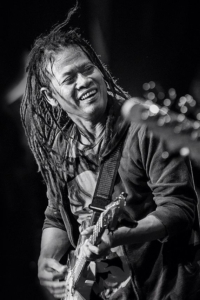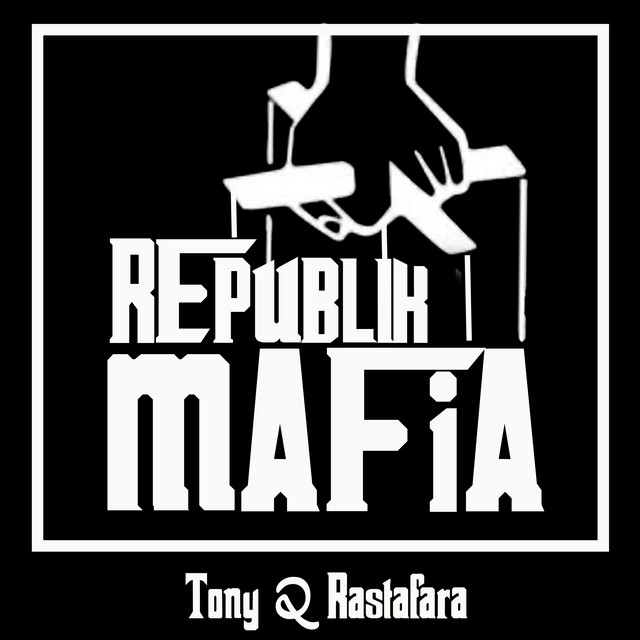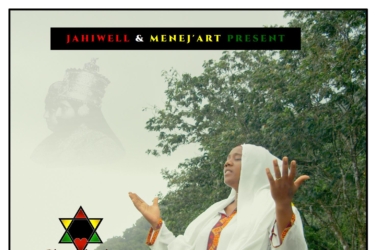The Master of Indonesian Reggae, Tony Q released his latest album titled Republik Mafia in August. Since 1989 he has remained consistent like a spring that never runs dry in flowing creations, refreshing and fertilizing the country’s reggae. This is his 13th studio album after the previous ones: Rambut Gimbal, (1996), Gue Falling In Love (1997), Damai Dengan Dengan Cinta (2000), Kronologi (2003), Salam Damai (2005), Anak Kampung (2007), Presiden (2009), Akustik Kurang Tambah (2010), Membentang Sayap (2012), Menjemput Mimpi (2014), Gembira Adalah Obat (2018) and Guru (2019).

In this 9-track album, Tony Q still maintains the extra-musical assemblage which becomes reggae’s specific aesthetic and mission, that is empathy for social issues and humanity. He tames the wildness of social criticism, desires and fantasies in the form of authoritative and poetic lyrics. He got this style from his love of reading poetry. The ethnic infusion accompanied by the character of his raspy bass vocal tone has become a unique trademark or marker that makes him easy listening and easily recognizable.
The album was produced by Tony Q independently and is available on digital platforms. The creative process took place in two countries, Australia and Indonesia. The song Melayang Lagi was even specifically inspired by a flight trip across these two countries. Meanwhile, the studio recording process involved two team session players in two different places namely Canggu, Bali and Bulungan, Jakarta. Four songs (Tragedi, Bali Asik, Terus Belajar, Kasmaran 420) were recorded in Bali, while five others (Ora Sudi Maning, Republik Mafia, Melayang Lagi, Sisa Rindu, and Nana Sajalah) were recorded in Jakarta.
Another unique fact is that all recording processes are carried out on the spot in the studio without any previous rehearsals. None of the players knew what songs would be recorded. All track charts were designed by Tony himself, who then jointly searched for the final touch in the studio. This method has been practiced since 2003 when he decided to pursue a solo career. According to his previous experience alongside Rastafara, what was practiced was often forgotten during recording sessions, therefore this raw method is the best way according to him. In addition, amidst the massive onslaught of technology today, Tony still maintains the ‘analogue’ technique. All bass guitar, brass section, guitar and drum track sessions are played live by humans without artificial plugs in. This is to produce a more organic or natural sound.
When asked about the inspiration or meaning behind each song in this album, especially some of the sarcastic and critical ones such as Republik Mafia, Tragedi and Ora Sudi Maning, Tony diplomatically replied that when a work has entered the public domain, the authority of interpretation belongs to the listener. He leaves the interpretation freely to his fans. However, he did not deny that the songs were indeed inspired by his anxiety about social and political realities in everyday life. How political and bureaucratic policies often clash with the welfare and peace of the common people.
The song Tragedi with allegorical fable nuances was inspired by the accumulation of two experiences of loss, namely the loss of trust, love and respect for policy makers who have destroyed democracy and the constitution and also the experience of loss due to theft of musical instruments experienced by Tony while touring. With laughter, Tony told another interpretation of this song by a fan who felt it was related to her love story. Her sincerity that was corrupted by her lover was likened to love that had been stolen by a dog.
“Cintaku dicuri anjing. Babi-babi dan monyet-monyet ikut membantu, Tikus-tikus juga ingin menikmati, ular serta buaya senang sekali”
For Tony, songs are a medium to convey advice that is not only intended to remind others but also himself to remain introspective and not go astray. According to him, once the songs come out, they will turn back to himself as a means of control to maintain his integrity.
“Have you ever been offered to become a member of the House of Representatives?” He smilingly replied: “It doesn’t work, we play for certain political parties but we always refuse.” He chooses to stay away from power so that he can still carry out his role as a musician who voices the voice of the people fairly.
Nana Sajalah, one of the tracks in this album is similar in title and content to Langensuko, a reggae band from Salatiga entitled ‘Nananana’ (2018). Is there any intertextual relationship? Tony admitted that he had never heard the song at all and what happened was a mere coincidence. There is no musician who is not inspired by other musicians, but plagiarism is something he never tolerates. Before making music, Tony said that he was a cassette seller so he had many references. His preferences of music are broad, not only reggae but also Dangdut, Gamelan, and rock music such as The Beatles, Led Zeppelin, Rolling Stones and System of Down.
The last track, Ora Sudi Maning is a highlight that emphasizes the singularity of Tony Q’s works which always infuse ethnic and traditional elements into his repertoire. He composed this song in Melbourne. He admitted that while living overseas, he grew to love his Javanese identity and became more and more proud of it.
(Yedi)







Show Comments (0)